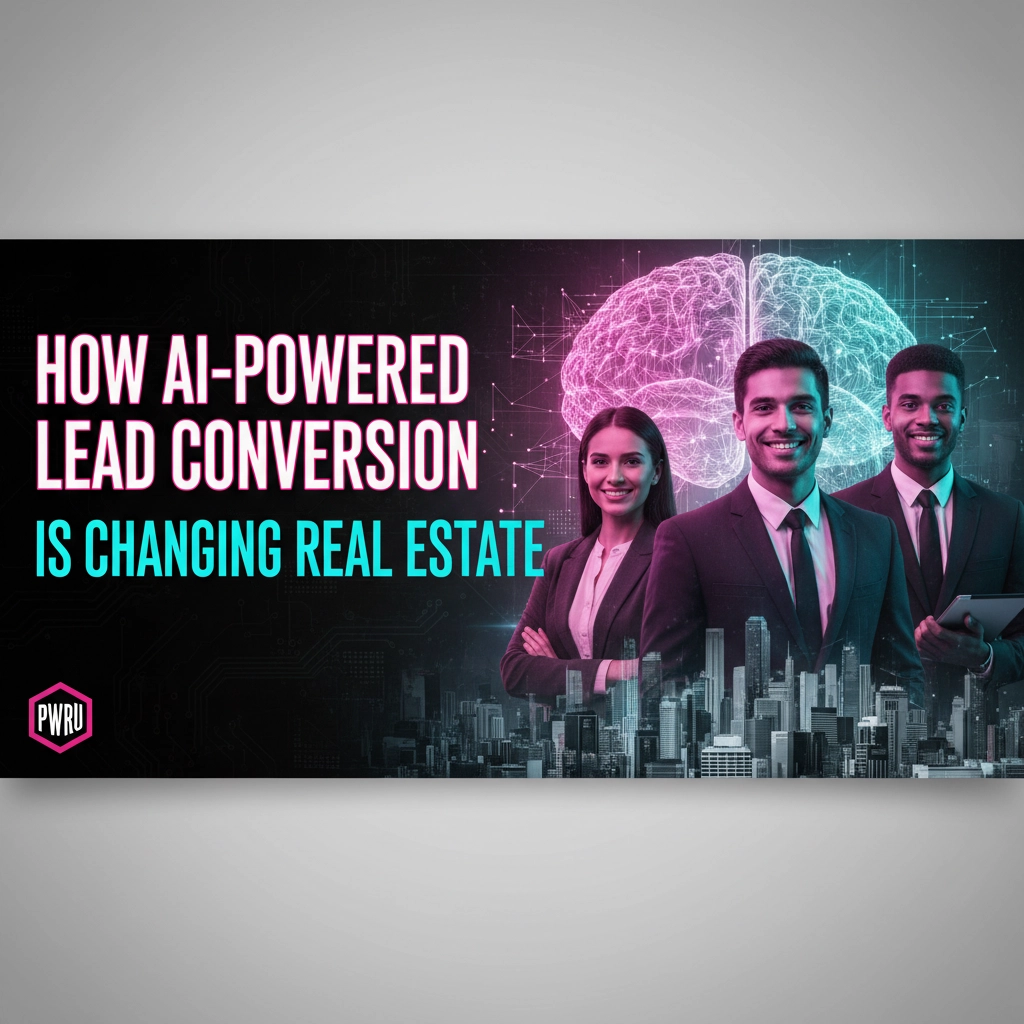Real estate agents using AI for lead generation close 23% more transactions than their competitors. This isn’t hype. It’s data from the 2024 NAR tech survey showing how artificial intelligence transforms prospect identification into predictable revenue.
The numbers tell the story: 25% boost in conversions, 30% reduction in administrative tasks, and significantly higher appointment booking rates. AI has moved beyond experimental to essential in modern real estate operations.
Lead Scoring Eliminates Guesswork
Traditional lead generation produces massive lists of names with minimal context. Agents waste hours calling unqualified prospects or chasing leads with no genuine purchase intent.
AI lead scoring changes this dynamic completely. Machine learning algorithms analyze browsing behavior, property searches, financial indicators, and engagement patterns to rank prospects by conversion probability.

SmartZip achieves 72% accuracy predicting which homeowners will move within six to twelve months. The system aggregates data from over 25 sources including public records, social media activity, and property search behavior.
High-quality AI-scored leads convert 30% more often than manually identified prospects. Agents focus energy on genuinely interested buyers instead of working through endless cold lists.
Lead scoring also identifies optimal contact timing. AI tracks when prospects are most likely to respond based on previous successful conversion patterns. This eliminates the guesswork of follow-up scheduling.
Conversational AI Handles Initial Qualification
Most real estate leads arrive outside business hours. Traditional response delays kill conversion opportunities before agents even know prospects exist.
AI chatbots provide instant engagement 24/7. These systems conduct intelligent conversations, asking budget questions, preferred neighborhoods, timeline requirements, and financing status.
The technology integrates with MLS systems for real-time property recommendations. When buyers ask about homes under $400,000 in specific areas, chatbots deliver accurate listings immediately.

One real estate company reported 9% conversion rates from chatbot interactions to booked appointments. Professionals using automated scheduling see average 33.5% increases in scheduled meetings.
Chatbots also provide instant home valuations for sellers. Property owners get immediate estimates while lead capture forms collect contact information for follow-up.
Predictive Analytics Identify Future Sellers
Traditional prospecting relies on expired listings, FSBO properties, and general marketing campaigns. AI predictive analytics identifies sellers before they list properties.
Machine learning examines life event indicators including job changes, family size modifications, financial transactions, and property search patterns. The algorithms predict selling probability months in advance.
Behavioral analysis tracks which property listings attract the most attention and which visitors show genuine buying signals. Social media engagement reveals users frequently interacting with real estate content.

Financial readiness indicators analyze publicly available data for pre-approval signals and mortgage research activity. This identifies prospects with actual purchasing power rather than casual browsers.
Agents using predictive analytics contact potential sellers when motivation is highest but competition remains minimal. This timing advantage converts more listings at higher commission rates.
Multi-Channel Engagement Maintains Connection
Modern buyers interact with real estate professionals across email, SMS, social media, and phone calls. Managing multiple touchpoints manually creates gaps where leads disappear.
AI platforms coordinate multi-channel engagement automatically. The systems track which communication methods produce the highest response rates for different prospect types.
Personalized email campaigns adjust content based on browsing history and expressed preferences. Machine learning optimizes send times, subject lines, and property recommendations for individual prospects.
Automated follow-up sequences ensure consistent contact without overwhelming prospects. AI determines optimal frequency and timing based on engagement patterns and conversion data.
PWRU Pulse Intelligence Streamlines Implementation
Traditional AI tools require complex integrations and technical expertise most agents lack. PWRU’s Pulse Intelligence simplifies artificial intelligence implementation for working professionals.
The platform automatically tracks lead sources, conversion rates, and engagement metrics. Agents see which marketing campaigns produce qualified prospects and which activities waste time and budget.
Pulse Intelligence integrates with existing CRM systems and marketing tools. The setup requires minimal technical knowledge while delivering enterprise-level analytics and automation capabilities.

Real-time dashboards show lead quality scores, optimal contact timing, and predicted conversion probabilities. Agents make data-driven decisions instead of relying on intuition or outdated strategies.
The system also tracks market trends and competitive intelligence. Users identify emerging opportunities and adjust strategies before competitors recognize market shifts.
Operational Changes Drive Results
AI implementation changes daily workflows significantly. Agents spend less time on administrative tasks and more time building relationships with qualified prospects.
Lead qualification happens automatically before human contact occurs. Agents know prospect budgets, timelines, and property preferences before initial conversations begin.
Automated appointment scheduling eliminates phone tag and reduces booking friction. Prospects schedule meetings through AI systems while agents handle higher-value activities.
Property recommendation engines suggest listings based on detailed preference analysis. Buyers see relevant options immediately instead of sorting through inappropriate properties.

Market analysis becomes predictive rather than reactive. Agents identify pricing trends, inventory changes, and demand patterns before they become obvious to competitors.
Documentation and transaction management streamline through intelligent automation. AI handles routine paperwork while agents focus on negotiation and client service.
Implementation Strategy for Success
Start with lead scoring and chatbot integration. These tools provide immediate improvements without requiring major workflow changes.
Choose platforms that integrate with existing systems rather than replacing entire technology stacks. Gradual implementation reduces learning curves and minimizes disruption.
Track specific metrics including conversion rates, response times, and appointment booking percentages. Measure AI impact against baseline performance to justify continued investment.
Train team members on new tools progressively. Focus on one capability at a time rather than overwhelming staff with multiple simultaneous changes.
Test different AI features with small prospect segments before full deployment. This approach identifies which tools produce the best results for specific business models.
Monitor competitor adoption rates and market positioning. Early AI implementation provides competitive advantages that diminish as technology becomes standard practice.
The real estate professionals achieving the highest growth rates combine AI efficiency with human relationship building. Technology handles routine tasks while agents focus on consultation, negotiation, and client service.
AI-powered lead conversion isn’t coming to real estate. It’s already here, producing measurable results for agents who implement these systems effectively.
Ready to see how Pulse Intelligence can transform your lead conversion process? Explore our analytics platform and start converting prospects more efficiently today.





